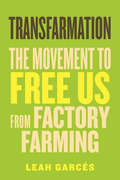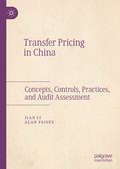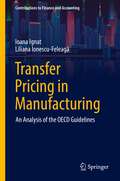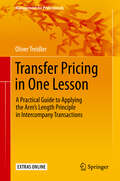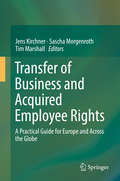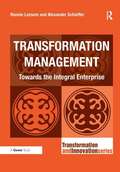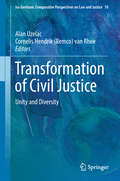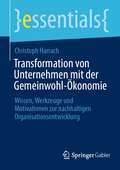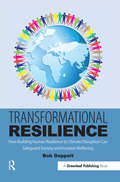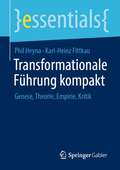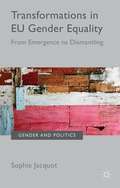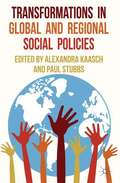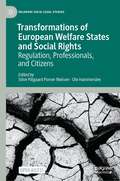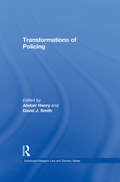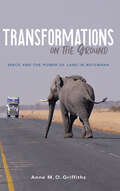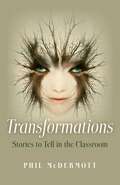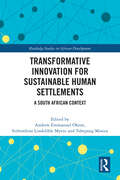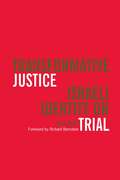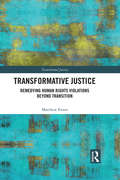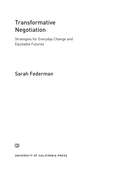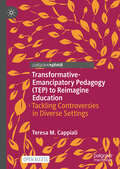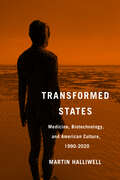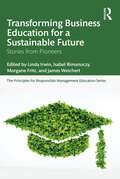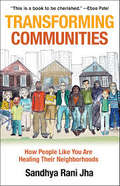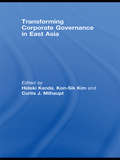- Table View
- List View
Transfarmation: The Movement to Free Us from Factory Farming
by Leah GarcésThe story of factory farmers, rescued farm animals, and rural communities standing up to big corporations and constructing their own new world that will change the way we eatIn Transfarmation, president and CEO of Mercy For Animals Leah Garcés explains how food and farming policies have failed over decades and offers insights into the wave of change coming from a new crop of farmers and communities who are constructing a humane and sustainable farming system. Factory animal farming faces an abundance of issues—from environmental concerns and animal cruelty, to exploited farmers and poor working conditions—and more and more farmers are searching for a way out and for a new start.Using insights from interviews and fieldwork, Garcés shares the perspectives of three groups:—Farmers—such as the Halley farm, where a family crushed by chicken factory farming builds a new way by transitioning their farm to growing hemp and rescuing dogs.—Animals—like Norma, an industrial dairy cow who was sentenced to death after injuring a worker in an effort to protect her calf.—Farm communities—including stories like how the hog industry in North Carolina preys on historically Black communities by contaminating the air and water for decades with hog pollution.Garcés demonstrates the reasons why we must end factory farming and calls on readers to imagine a future world where Transfarmation is complete and we have transitioned to a just food and farming system.
Transfer Pricing in China: Concepts, Controls, Practices, and Audit Assessment
by Jian Li Alan PaiseyThis book offers up to date insights into the exciting world of China’s extensive economic activity through the pervasive and often secretive practice of transfer pricing. It begins with an explanation of transfer pricing itself and goes on to explore how intricately it can infiltrate the trading practices of the commercial lives of both foreign companies in China and Chinese companies expanding to other countries. A review of the main industries in China also considers their possible future uncertainties. China has joined other authorities in actively legislating and organizing a regime to implement its arm’s length policy, as related in Part I of the book on concepts and controls. This is then followed by Part 2 which is devoted to a collection of cases showing the breadth and variability of companies actively seeking to maximise their profits, while Part 3 of the book gives a rare record of the order of priorities exercised by one hundred Chinese tax officers engaged in auditing company performance. The book ends with a summary of the future trends, and activities that regulatory authorities are likely to undertake.
Transfer Pricing in Manufacturing: An Analysis of the OECD Guidelines (Contributions to Finance and Accounting)
by Ioana Ignat Liliana Ionescu-FeleagăTransfer pricing is considered a new and complex concept in terms of guidelines and regulations. In this context, more and more academics and tax professionals are interested in understanding the mechanism of a transfer pricing analysis. The main objective of the book is to help them in this process by presenting in a practical approach (using case studies and schemes) and in accordance with the OECD Transfer Pricing Guidelines for Multinational Enterprises and Tax Administrations the way in which are operating the basic transfer pricing elements. Moreover, considering that the manufacturing sector is the chief wealth-producing sector of the global economy, the book illustrates complete transfer pricing analyses applicable for manufacturing transactions (using Orbis database). In the end, the book presents some recent disputes between manufacturing entities and tax authorities in relation to the transfer pricing analysis for manufacturing transactions.Chapter “TAMSAT” is available open access under a Creative Commons Attribution 4.0 International License via link.springer.com.
Transfer Pricing in One Lesson: A Practical Guide to Applying the Arm’s Length Principle in Intercompany Transactions (Management for Professionals)
by Oliver TreidlerThis book provides a concise and pragmatic introduction to transfer pricing. Approaching the subject from an economic and business perspective, it familiarizes the reader with the basic concepts without getting sidetracked by tax law. In turn, the book draws on case studies to demonstrate the identification and application of appropriate transfer pricing methods for the most common intercompany transactions. The intuitive step-by-step guidance, together with integrated Excel-based tools, will equip the reader to ensure compliance with the arm’s length principle and thus to minimize tax risk. Based on the post-BEPS OECD Guidelines, the book’s content is applicable to a global context.
Transfer of Business and Acquired Employee Rights
by Jens Kirchner Tim Marshall Sascha MorgenrothThis book provides practical, business-orientated and accessible guidance on key employment and labour law aspects in national and international transfers of business in the European Union, its member states and selected important countries around the world. It contains a comprehensive overview of relevant topics such as safeguarding of employees' rights, impacts on employees' representatives and on collective agreements, company pension entitlements, insolvency, M&A transactions and cross-border transfers of business for each country covered. This overview is accompanied by summaries of leading case law and excerpts of important national regulations. Transfers of business play an important role in today's globalised business world. In particular, employment and labour impacts of transfers of businesses are often a driving legal and business factor in national and international restructurings and M&A transactions. The successful implementation of transfers of business requires to recognise and comply with the relevant legal frameworks of the countries involved. This publication is written by specialised employment lawyers from around the globe and addresses in-house counsels, human resources managers and legal advisors in charge of or accompanying national or international transactions.
Transformation Management: Towards The Integral Enterprise
by Ronnie Lessem Alexander SchiefferTransformation management, argue the authors of this inspirational book, now provides the opportunity for the application of the first significant world-wide innovation in the way we manage since Drucker put management itself on the map in the 1950s. In a book that draws on seminal theses and practical examples from the four corners of the world, Ronnie Lessem and Alexander Schieffer provide leaders, students of leadership, managers and change agents with a trans-culturally tested, integrated approach to leadership and management.
Transformation of Civil Justice: Unity And Diversity (Ius Gentium: Comparative Perspectives on Law and Justice #70)
by Alan Uzelac Cornelis Hendrik van RheeNational civil justice systems are deeply rooted in national legal cultures and traditions. However, in the past few decades they have been increasingly influenced by integration processes at the regional, supra-national and international level. As a by-product of the emergence of economic and political unions and globalisation processes there is pressure to harmonise or even unify the way in which national civil justice systems operate. In an attempt to create a ‘genuine area of justice’, new unified procedures are being developed, which operate in parallel with national civil procedures, and sometimes even strive to replace them. As a reaction to the forces that endeavour to harmonise and unify procedural laws and practices, an opposing trend is gaining momentum: one that insists on diversity and pluralism of national civil procedures. This book focuses on the evolution of procedural reforms in various jurisdictions and the ongoing transformation of national civil justice systems.
Transformation von Unternehmen mit der Gemeinwohl-Ökonomie: Wissen, Werkzeuge und Motivationen zur nachhaltigen Organisationsentwicklung (essentials)
by Christoph HarrachDieses Buch dient als Inspiration, um die nachhaltige Organisationsentwicklung nach den Kriterien der Gemeinwohl-Ökonomie (GWÖ) zu fördern. Die Inhalte stellen eine ausgewogene Mischung aus wissenschaftlich validen Erkenntnissen aus der Betriebswirtschafts- und Managementlehre sowie praktischen Erfahrungen aus dem betrieblichen Alltag dar. Das Buch gliedert sich in einen einführenden Teil und einen praktischen Teil. In der Einführung werden Konzepte der Nachhaltigkeit vorgestellt sowie die Rolle der Wirtschaft. Dabei liegt ein Schwerpunkt auf personalzentrierten Transformationsansätzen an der Schnittstelle zwischen Nachhaltigkeits-, Innovations- und Personalmanagement. Im praktischen Teil lernen die Leser:innen die „Gemeinwohl-Matrix“ kennen und wenden diese mit dem „Gemeinwohl-Check“ auf ihre Organisation an.
Transformational Resilience: How Building Human Resilience to Climate Disruption Can Safeguard Society and Increase Wellbeing
by Bob DoppeltUsing the author’s extensive experience of advising public, private and non-profit sectors on personal, organization, and community behavioral and systems change knowledge and tools, this book applies a new lens to the question of how to respond to climate change. It offers a scientifically rigorous understanding of the negative mental health and psychosocial impacts of climate change and argues that overlooking these issues will have very damaging consequences. The practical assessment of various methods to build human resilience offered by Transformational Resilience then makes a powerful case for the need to quickly expand beyond emission reductions and hardening physical infrastructure to enhance the capacity of individuals and groups to cope with the inevitable changes affecting all levels of society.Applying a trauma-informed mental health and psychosocial perspective, Transformational Resilience offers a groundbreaking approach to responding to climate disruption. The book describes how climate disruption traumatizes societies and how effective responses can catalyze positive learning, growth, and change.
Transformationale Führung kompakt: Genese, Theorie, Empirie, Kritik (essentials)
by Karl-Heinz Fittkau Phil HeynaSeit den frühen 1980er Jahren hat keine andere Theorie in der Führungsforschung mehr Aufmerksamkeit erfahren als die transformationale Führung. Ebenso wird deutlich, dass die Auseinandersetzung mit dieser bis heute unvermindert andauert und sie die jüngere Führungsforschung nachhaltig geprägt hat. Bei näherer Betrachtung wird ersichtlich, dass insbesondere das theoretische Modell von Bernard M. Bass auf eine hohe Resonanz gestoßen ist. Aus diesem Grund wird dieses Modell dargestellt, einschließlich dessen Genese, Theorie, Messbarkeit, Lehr- und Lernbarkeit, Empirie und Kritik.
Transformations in EU Gender Equality: From Emergence to Dismantling (Gender And Politics)
by Sophie JacquotIn a context of economic and budgetary crisis, this book presents a long-term analysis of the transformations of EU gender equality. It analyses the mechanisms of construction, consolidation and deconstruction of this policy and questions the effects of its current dismantling.
Transformations in Global and Regional Social Policies
by Paul Stubbs Alexandra KaaschThis book discusses key issues in global and regional social policy, exploring Bob Deacon's pioneering approach to regulation, rights and redistribution. It addresses the role of international actors in shaping social policy and discusses the problems and possibilities of new alliances for global social justice.
Transformations of European Welfare States and Social Rights: Regulation, Professionals, and Citizens (Palgrave Socio-Legal Studies)
by Ole Hammerslev Stine Piilgaard Porner NielsenThis open access edited book investigates European social rights in practice from socio-legal perspectives. It brings together fourteen socio-legal scholars, representing Nordic and Western European countries, who analyse different aspects pertaining to European social rights, namely the regulation of social rights, encounters between welfare professionals and citizens, and citizens’ mobilisation of social rights. These three different aspects from the structure for the sections in the anthology, each analysing transformations related to regulation, encounters and rights mobilisation. The book contributes to the existing literature as it focuses on interdependent transformations on macro, meso and micro levels which are key for understanding processes and contexts related to European social rights in practice. It speaks particularly to academics in sociology of law and/or regulation.
Transformations of Policing (Critical Studies in Jurisprudence)
by Alistair HenryPolice and People in London is still the largest and most detailed study of a police force and its relations with the public that has yet been undertaken in Britain. The twenty-three years since its publication has seen a constantly-accelerating rate of change in the legal framework of policing, in the arrangements for democratic accountability of the police, in the technologies involved in crime and policing, in management structures and methods in the police service, in financial control systems imposed by central government and in methods of assessing police performance. Over the same period, crime control has moved from the bottom to the top of the political agenda, leading to increasing pressure on the police to be seen to be effective. Transformations of Policing returns to the central issues discussed in 1983 and considers whether the main conclusions need to be revised in the light of what has happened since. It also reviews areas of debate and research that have emerged more recently and highlights areas of turbulence that are creating fundamentally different patterns from before and raising genuinely new questions.
Transformations on the Ground: Space and the Power of Land in Botswana (Framing the Global)
by Anne M. GriffithsA study of Botswana’s dual face of prosperity and poverty and that relates to its land use policies.Transformations on the Ground considers the ways in which power in all its forms—local, international, legal, familial—affects the collision of global with local concerns over access to land and control over its use. In Botswana’s struggle to access international economies, few resources are as fundamental and fraught as control over land. On a local level, land and control over its use provides homes, livelihoods, and the economic security to help lift populations out of impoverishment. Yet on the international level, global capital concerns compete with strategies for sustainable development and economic empowerment. Drawing on extensive archival research, legal records, fieldwork, and interviews with five generations of family members in the village of Molepolole, Anne M. O. Griffiths provides a sweeping consideration of the scale of power from global economy to household experience in Botswana. In doing so, Griffiths provides a frame through which the connections between legal power and local engagement can provide fresh insight into our understanding of the global.“Botswana is a darling of international donors and regularly praised as an upwardly mobile, prosperous and successful country. At the same time, it is characterized by poverty and exclusion, especially of women. In her insightful case study on land politics, Anne Griffiths effectively contrasts the image of a coherent state against myriad realities and confusion of competences on the ground. Based on decades of ethnographic fieldwork, this book masterfully demonstrates how in the realm of land and law, international, national, regional and local domains intersect and overlap, and come into conflict with one another.” —Andreas Eckert, Humboldt University Berlin“Anne Griffiths’ ambitious and original book reveals how the “global” is always situated in specific places and times through her insightful analysis of how land in Botswana has figured in practices, policy and politics from the standpoints of household, family, village, district, national and international levels. Griffiths’ astute use of political and legal history, legal documents, observation of statutory and customary law settings, multi-generational life histories and detailed ethnography enable her to provide a rich and informative account that goes well beyond the mantra of “the global in the local.” While insisting on foregrounding “the voices, perceptions, and experiences of people’s relationships with land,” Griffiths shows how these interact with national politics, policies, laws and legal practice and with the effects of international and global agencies and processes to produce inequality and class differences, despite some improvement in gendered patterns of land entitlement.” —Pauline Peters, Faculty Associate, Harvard Kennedy School and Center for African Studies
Transformations: Stories to Tell in the Classroom
by Phil McDermottThese six stories are the perfect companions to the topics, SEAL work and Literacy Units for teachers and children in the primary classroom. They are to be read aloud but can be enjoyed in solitude. These include myths and legends, based around the subject of transformations dealing with issues and dilemmas to stimulate speaking, listening, responding and writing. The stories are accompanied by a commentary and exercises for use as teaching tools.
Transformative Innovation for Sustainable Human Settlements: A South African Context (Routledge Studies in African Development)
by Andrew Emmanuel Okem Sithembiso Lindelihle Myeni Tshepang MosieaThis book uses the transformative innovation policy (TIP) as a lens to show how innovative processes, practices and systems could address critical challenges and facilitate the delivery of sustainable human settlements in South Africa.The TIP approach shows that addressing societal problems is not a function of a technical solution within a government department but one that requires partnership with multiple stakeholders. The book argues that it is essential to understand and embrace innovation policy that is transformative and responds to the social and environmental needs at local, provincial and national levels. It demonstrates that innovation policy should focus on transforming the socio-technical systems that demand embracing notions such as experimental delivery and learning, directionality and inclusivity. Chapters explore the ability of the state to transform its organisational processes and capacity to improve and align its planning, implementation, monitoring and evaluation systems to high levels of efficiency and sustainability targets.Bringing together various theoretical and empirical perspectives on innovation in the context of sustainable human settlement, this book will be of interest to scholars and students in the fields of Housing, Human Settlements, Architecture, Public Policy, Development Studies, Civil Engineering, Political Science and Public Administration.
Transformative Justice: Israeli Identity on Trial
by Leora BilskyCan Israel be both Jewish and democratic? Transformative Justice, Leora Bilsky's landmark study of Israeli political trials, poses this deceptively simple question. The four trials that she analyzes focus on identity, the nature of pluralism, human rights, and the rule of law-issues whose importance extends far beyond Israel's borders. Drawing on the latest work in philosophy, law, history, and rhetoric, Bilsky exposes the many narratives that compete in a political trial and demonstrates how Israel's history of social and ideological conflicts in the courtroom offers us a rare opportunity to understand the meaning of political trials. The result is a bold new perspective on the politics of justice and its complex relationship to the values of liberalism. Leora Bilsky is Professor of Law, Tel Aviv University.
Transformative Justice: Remedying Human Rights Violations Beyond Transition
by Matthew EvansTransitional justice mechanisms employed in post-conflict and post-authoritarian contexts have largely focused upon individual violations of a narrow set of civil and political rights, as well as the provision of legal and quasi-legal remedies, such as truth commissions, amnesties and prosecutions. In contrast, this book highlights the significance of structural violence in producing and reproducing rights violations. The book further argues that, in order to remedy structural violations of human rights, there is a need to utilise a different toolkit from that typically employed in transitional justice contexts. The book sets out and applies a definition of transformative justice as expanding upon, and providing an alternative to, transitional justice. Focusing on a comparative study of social movements, nongovernmental organisations and trade unions working on land and housing rights in South Africa, and their network relationships, the book argues that networks of this kind make an important contribution to processes advancing transformative justice.
Transformative Negotiation: Strategies for Everyday Change and Equitable Futures
by Sarah FedermanA contemporary guide to negotiation that centers an understanding of power Transformative Negotiation advances an understanding of power and oppression as core to negotiation, arguing that negotiation is central to social mobility and social change. Bringing theory into action, the book explores the real-world examples that Sarah Federman’s own students bring to class, such as negotiating with courts to get their kids back or with the IRS to reduce late fees. Federman explains how heritage, ethnicity, wealth, gender, age, education, and other factors influence what we ask for and how people respond to our requests, as well as what is at stake when we negotiate. This book provides tools to help readers gain confidence in their everyday negotiation skills and link personal success to social transformation.
Transformative-Emancipatory Pedagogy (TEP) to Reimagine Education: Tackling Controversies in Diverse Settings
by Teresa M. CappialiThis book advocates for a paradigm shift in education through Transformative-Emancipatory Pedagogy (TEP)—a dynamic framework grounded in humanistic, humanizing, and decolonial philosophies. TEP promotes holistic, inclusive, and experiential learning, with a focus on personal and societal transformation. Initially developed to address controversial and sensitive topics in diverse social science classrooms, TEP reimagines education for an increasingly diverse and interconnected world. By harnessing learners' diverse knowledge and perspectives, TEP fosters critical thinking and active citizenship. More than a framework for inclusion, TEP enriches education by empowering learners to engage with complex social issues, preparing them to navigate and shape the world with empathy, agency, and a commitment to social justice. This is an open access book.
Transformed States: Medicine, Biotechnology, and American Culture, 1990–2020
by Martin HalliwellTransformed States offers a timely history of the politics, ethics, medical applications, and cultural representations of the biotechnological revolution, from the Human Genome Project to the COVID-19 pandemic. In exploring the entanglements of mental and physical health in an age of biotechnology, it views the post–Cold War 1990s as the horizon for understanding the intersection of technoscience and culture in the early twenty-first century. The book draws on original research spanning the presidencies of George H. W. Bush and Joe Biden to show how the politics of science and technology shape the medical uses of biotechnology. Some of these technologies reveal fierce ideological conflicts in the arenas of cloning, reproduction, artificial intelligence, longevity, gender affirmation, vaccination and environmental health. Interweaving politics and culture, the book illustrates how these health issues are reflected in and challenged by literary and cinematic texts, from Oryx and Crake to Annihilation, and from Gattaca to Avatar. By assessing the complex relationship between federal politics and the biomedical industry, Transformed States develops an ecological approach to public health that moves beyond tensions between state governance and private enterprise. To that end, Martin Halliwell analyzes thirty years that radically transformed American science, medicine, and policy, positioning biotechnology in dialogue with fears and fantasies about an emerging future in which health is ever more contested. Along with the two earlier books, Therapeutic Revolutions (2013) and Voices of Mental Health (2017), Transformed States is the final volume of a landmark cultural and intellectual history of mental health in the United States, journeying from the combat zones of World War II to the global emergency of COVID-19.
Transforming Business Education for a Sustainable Future: Stories from Pioneers (The Principles for Responsible Management Education Series)
by Isabel Rimanoczy Linda Irwin Morgane Fritz James WeichertAs the impact of climate change becomes more evident and dire, business leaders, educators, students, and academic leaders are deciding what they need to change and do to survive and thrive in a new and dramatically different environment. This book sets out how to transform business education and integrate sustainability practices into curriculum and a wider academic culture. While some universities around the globe are still teaching business practices that have contributed to human and environmental crises, pioneering educators and higher education institutions are researching, developing, and implementing programs to transform business education and practices. With stories from 26 administrators, researchers, and faculty across the globe, this book inspires business educators with innovative tools and creative solutions to address challenges in the business world and society. These pioneers are helping students and business ventures change the way they conduct business to survive and thrive in a fast-changing global environment. Their unique and personal journeys offer tools, models, lessons-learned, and inspiration for change. The book will both inspire and guide faculty members, administrators, students, and alumni to transform business education for a sustainable future.
Transforming Communities: How People Like You Are Healing Their Neighborhoods
by Sandhya Rani JhaThe world around us is a wreck. When there's so much conflict around the country and around the corner, it's easy to feel overwhelmed, powerless, and helpless. What can one person do to make a difference? Here's the good news. Millions of everyday people are ready to step into their power to transform their communities. And you are one of them. Take heart and be inspired by real stories of ordinary people who took action and changed their corner of the world, one step at a time. Equal parts inspiration, education, and Do-It-Yourself, Transforming Communities by veteran community activist Sandhya Jha will open your eyes to the world-healing potential within you, and give you the vision, the tools, and the encouragement to start transforming your neighborhood, one person at a time.
Transforming Corporate Governance in East Asia
by Hideki Kanda Kon-Sik Kim Curtis MilhauptOver the past ten years, the corporate governance environment in East Asia has undergone a significant transformation. The Asian Financial crisis, together with Japan‘s long economic malaise, undermined confidence in the corporate structures, governance practices, and regulatory oversight of firms in the region. Since that time, each of the countri
